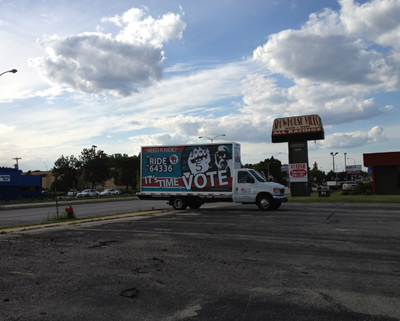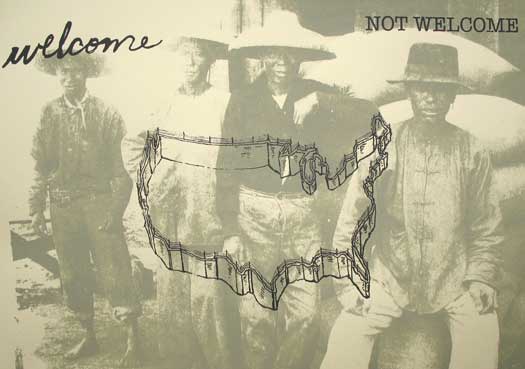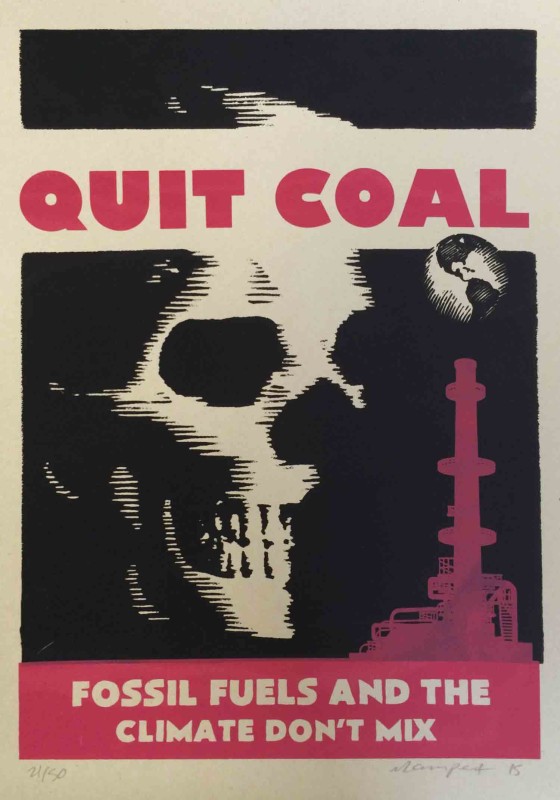
The Wisconsin Uprising ended with a recall election and the recall election ended with an abrupt thud. Many expected a razor tight contest – one that was sure to end in a recount. Instead it was over by 9:00pm, an hour after the polls had closed. It ended when embattled Republican Governor Scott Walker soundly defeated Democratic challenger Tom Barrett 53%-46%. It ended when a graph of the state pictured Wisconsin bright red, outside of a few blue pockets in Milwaukee County, Dane County, and a handful of other counties, including the far northwest corner.
For all of us who have resisted Walker’s agenda and helped create the Wisconsin Uprising this is a crushing blow. There is no sugar coating it. This is a loss that will be felt for years, if not decades. Walker’s attack on workers, public unions, public education, public health care, women, and the environment created a mass movement, and on June 5th Wisconsin voters voted against that movement.
This was not simply a vote for Walker over Barrett. Nor was it simply a vote against the recall process. It was a vote against public employee unions. This was the dream scenario for the 1%.
This was Wisconsin worker’s voting with venom against other Wisconsin workers. 38% of voters living in union households voted for Walker – the same politician who “dropped the bomb” on public employee unions in February of 2011, the one who operates from the playbook of ALEC (The American Legislative Exchange Council) and the Koch brothers, and the one who schemed with a billionaire funder to “divide and conquer” labor unions with the eventual goal of turning Wisconsin into a “right-to-work” state. This was a story of class war in America: the 1% against the 99% and the middle class and lower class against each other.
This is a tragic story of a failed movement and a litany of failed tactics. The strategy of the Democratic Party and the union leadership was to redirect the anger and energy of a mass movement into recall elections – a strategy that did not produce a backlash against Walker, nor the billionaires who enable him. Instead, it produced a backlash against public school teachers, nurses, bus drivers, and other public service employees.
Recall elections created the scenario where Republicans could win. Republican’s excel at getting their people to the polls and they excel at raising money to carpet bomb the pubic with misleading information. 53% of the voting public bought into Walker’s rhetoric and ignored the fact that Wisconsin has a political crisis, not a budget crisis. Voters swallowed whole Walker’s claim that Wisconsin was broke and the only remedy was massive cuts to public programs to fix the budget. Ignored was information about Walker’s huge tax breaks to the rich that raised the deficit and defunded the public sphere, while opening up more avenues to privatization. Ignored was the concession that union leaders offered to Walker to help tackle the budget by having their members pay more for their benefits. Ignored was the reality that during the steady decline of unions over the past thirty years, medium household incomes have declined while the income growth of the top 10% has shot through the roof – by 75% since 1980 (the year Reagan broke the air-traffic controllers strike.) Instead, Wisconsin voters allowed Walker to scapegoat middle class and lower class public employees – many of which who earn between 20,000 and 50,000 per year.
In the aftermath of Walker’s victory some will point to the usually players in an attempt to make sense of this election – the power of Citizens United, the Koch brothers, and others to buy elections wholesale. The obscene amounts of money that was spent (Walker out spent Barrett 32 million to 4.6 million and had a six-month lead to blanket the state with his message.) Some will point to Walker’s election commercials that bordered on Orwellian – commercials that championed his record on creating new jobs, when in fact, Wisconsin ranks last in the Midwest, if not the nation, in job growth under his reign. Some might blame Fox News, the Milwaukee Journal Sentinel, and other right-wing news sources for keeping the public ignorant and uninformed. While others will argue that Barrett was a terrible candidate, one who does not inspire passion, and one who is easy to attack by virtue of representing Milwaukee-the fourth poorest city in the country. All of these points have merit and all played a role in Walker’s victory, but it does not inform us about the central story line of the recall election itself – the animosity that middle class and lower class workers have for one another, and the ramifications of class conflict aimed within, and not at the top. Nor does it inform us about the racial undertones of the recall election – a state that is overwhelmingly white – particularly in the rural and suburban areas – voting for Walker, in contrast to the African American population in Milwaukee and a handful of other cities that voted almost exclusively against him.
This reality – the class and race dimensions – presents a grim future for Wisconsin and the nation. Public employee unions in Wisconsin are now on life support and have been since Walker signed Act 10 in 2011. Wisconsin’s public employee unions have lost their rights to collective bargaining and they can no longer automatically deduct dues for their members. This greatly reduces the money pot for the unions and the Democratic Party, and this was the ALEC game plan from the start. Destroy the electoral chances of the Democratic Party by crippling a significant funding source. The expected result: Republicans should have a cakewalk in winning future elections for the house, senate, and gubernatorial races in Wisconsin.
The lessons from Wisconsin for Republicans across the country are simple: scapegoat unions and public employees and you can get away with robbery. Consider this, 53% of the public voted for Walker after he slashed $800 million from the public schools, with plans to strip K- 12 education of another $1.6 billion over the next two years. At the same time, Walker provided a $13,000 voucher to wealthy families with a disabled student to offset the costs of private school tuition. Families with disabled students in public schools got no such reprieve.
People voted for Walker after he cut 30% of the budget for technical colleges, and $250 million from the UW system, resulting in a 5.5% tuition increase for the 2012-2013 academic year at UW Madison. The public voted for Walker after he cut over 500 million from the state health care plan – Badger Care –removing 17,000 people from its ranks after attempting to cut 65,000 people from the program until the federal government threatened a lawsuit. 47% of women voted for Walker after he ended equal pay protection for women. These issues, along with the dismal job numbers, the attacks on collective bargaining, the John Doe investigation, and his overall distain for the democratic process (pushing through legislation without quorum and in the middle of the night) should have given voters ample reasons to vote in droves against him. Instead, Wisconsin voted 53-46 to keep him power and according to exit polls nearly one fourth of union members – presumably many from private unions – voted for him.
This is staggering. While much of Europe has begun to reject austerity measures, Wisconsin voters have endorsed it. Amidst a severe depression, Wisconsin voted for the politician that is driving people into poverty. This is the blue print for fascism. Gain absolute power, divide the population, turn workers against one another, and play on the public’s worst fears when they are the most vulnerable.
This does not bode well for the future. Many Wisconsonites will likely have buyer’s remorse over the next two-and-a-half years as Walker continues his onslaught. Wisconsin can sadly expect a massive jump in poverty, unemployment, foreclosures, and violence in its cities and communities. I would be shocked if Walker did not go after the collective bargaining rights of those public employees spared from Act 10 (police and firefighters) and I would be shocked if he did not go after the private unions by signing right-to-work legislation in the not-so-distant future.
Arguably, the only bright spot of one of Wisconsin’s darkest hours was a single victory in regaining a Senate seat. This shifts the Senate power back to the Democrats, but this “victory” is temporary. Democrats can block Walker’s agenda, but the next round of Senate elections will take place in November and the Republican-drawn redistricting maps should allow them to easily gain control of the Senate, House, and Governors office for years to come.
Questions should also loom on how the Wisconsin Uprising, a spontaneous grass roots movements and one of Wisconsin’s finest moments that began with a two-week occupation of the State Capital Building, was channeled into recall elections. The beginning of the end began when Democrats and union leaders controlled the stage and the speaker list at the massive demonstrations in Madison during the Winter and Spring of 2011. “Organizers” continuously marched out the same tired speakers and the same tired tactics – recall elections – that played directly into the Republican’s strength. This cautious tactic – that was also voiced by many in the streets – derailed the Wisconsin Uprising and allowed Democrats and union leaders to call the shots. More so, the hierarchical approach countered the success of so many past and present movements whose strength lies in their de-centralized structure – affinity groups, a multiplicity of voices and tactics, direct action, and civil disobedience. The Wisconsin Uprising, outside of the first two weeks, was the antithesis of the 1999 WTO protests in Seattle that organized affinity groups through the Direct Action Network. It was the antithesis of the Occupy Wall Street Movement that embraced general assemblies and open microphones. And it was the antithesis of the labor movement outside the borders of the US that uses strikes and work slowdowns to bring society to a standstill when attacks on working class people become eminent. That is the power of unions and the labor leaders in Wisconsin chose not to flex it.
Instead, the Wisconsin Uprising was led by Democrats and union leaders who kept their members powerless and urged them to simply march, donate money, and to vote. All the while, when the protests fell silent and Walker ruled the airwaves for six months leading up to the recall primary, the AFL-CIO did next to nothing. No large-scale media campaign and no mass education outreach to the public about the importance of unions. The consequence: Walker painted the public unions and public employees (particularly teachers) as the bullies.
The lesson for those of us engaged in the Wisconsin Uprising: Why did we not break ranks? Why did we not fight both Walker and the tactics of those who tried to assume leadership of the mass movement? Why did people not take matters into their own hands? Why were we dependent on them?
These questions will loom large for years, but the immediate question is how people should organize and resist within a post-recall climate in Wisconsin. Despair is not an option. Nor is reconciliation. Both Walker and Barrett spoke of the need to mend the fences and work together immediately following the election. This advice was disgraceful and played into the hand of Walker, the Republicans, and the Democratic machine that is equally beholden to corporate power. Wisconsinites need to outright reject the Walker agenda and they need to oppose him and all he represents at every step of the way.
More importantly, people need to look towards other forms of organizing. Progressives should abandon the Democratic Party in droves. What is needed is a third party that speaks to the lower class. Organized labor should de-invest from the Democrats (and the Republicans) and champion a third party that speaks to the crisis of capital and the crisis of a broken system. Wasting energy on Obama’s 2012 re-election campaign is a kin to working class people volunteering their time to help Exxon Mobil, Chase Bank, Goldman Sachs and other corporate giants earn more money. Energy is better served on local grassroots campaigns and alternative structures (from neighborhood cooperatives and worker-owned businesses to supporting rural family farmers and urban farmers) that can provide relief, alternatives, and sustainability amongst a broken and de-funded public sphere.
To counter this crisis, Wisconsin activists need to use every tool at their disposal. The mentality of the early 2012 Wisconsin anti-mine movement needs to be embraced. Mike Wiggins, Jr. – chairman of the Bad River Band of Lake Superior Tribe of Chippewa Indians – set the tone when he denounced the that mining bill (AB 426) that was written by mining companies: “This bill represents corporate interests over the rights of citizens and over the interests of clean air and water. Our fight has just begun. We are just like that Penokee Mountain. We’re not going anywhere. We will use every tool in our war chest to defend our water and air.”
We need to embrace this tone and we need to re-imagine a new political space. The tactics of the recalls were a complete failure, not once, but on three separate occasions during the last year and a half. Once upon a time labor unions in the US embraced radical industrial unionism. Now, organized labor is a shell of its former self. The decline of organized labor is tragic, but the real tragedy of June 5th is a divided public – a middle class and a lower class that tears itself apart. In 2011, the Wisconsin Uprising offered the chance for class solidarity and a people’s movement capable of defeating Walker. 2012 represents the worst-case scenario. Walker’s divide and conquer mentality becoming internalized.








Nick:
You hit on a number of important points, themes, and issues missed by others in the flurry of recent commentaries and analyses.
One critical point: your use of the term “lower class”. In actuality a term developed by bourgeois-ologists of various stripe to actually avoid the taboo notion of a working class, in broader usage it has long had implicit pejorative connotations. The constant trope of those of whom you are critical within the ranks of (increasingly) organized labor and the Democratic Party has been the notion that the entire struggle, pre-recall and after has been one to “save the middle class”. (Barrett’s campaign was rife with it.) That narrow focus in turn lopped off whole strata of the working class, making them invisible and irrelevant. We’re talking here about the unemployed and under-employed, the elderly on limited income, the poor, and people who once materially and subjectively have viewed themselves as “middle class,” now “downwardly mobile”. The powers that be, in a bipartisan fashion have been waging a lopsided “class war”. To relegate a large chunk of the forces we need on our side to something called “the lower class” merely serves to bolster the existing predominate power arrayed against the “subordinate classes”.
Again, thanks for your thoughtful contribution.